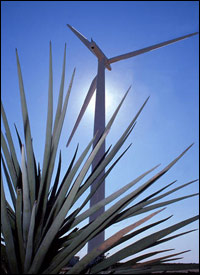What is Goldman Sachs doing in rural Texas? Probably some of its bankers have wondered that themselves, when they find they’re three hours from the nearest latte.

A Texas turbine.
Photo: NREL / Cielo Wind Power
One of Goldman’s subsidiaries, Houston-based Horizon Wind Energy, is constructing a $600 million, 400-megawatt wind farm in the boonies west of Dallas. Financiers of other wind-power projects and explorations, spread across central and west Texas, include Wells Fargo; JPMorgan Chase; Macquarie, Australia’s largest investment bank; and John Deere’s credit division, which already has close ties to rural America.
To some extent, the lure of wind for such financial powerhouses is obvious. Bankers are always looking for high-growth sectors for investment or loans. Wind fits the bill, as the fastest-growing energy segment in the world. In Texas — which last year passed California to become the largest wind-power producer in the U.S. — the boom is sometimes likened to the gold rush. Energy giants such as BP and Shell are investing heavily too.
From the perspective of local developers, the interest is more than welcome. “It’s nice to have steady financial backing,” says Randy Sowell, a wind developer in West Texas. His company, Austin-based Fremantle Energy, has entered into a joint venture with Macquarie to start up wind and renewable-energy projects in the U.S. “You need to have that substantial muscle behind you to have that commitment.”
Rob Powell of Austin-based Verde Energy also appreciates the long-range financing that big banks can provide. Verde Energy, which helps homeowners and businesses get quotes for installation of renewable-energy systems, recently partnered with Wells Fargo, which will make loans to homeowners seeking an installation.
Big-money backers are particularly crucial when it comes to buying wind turbines. Manufacturers haven’t been able to keep up with soaring global demand, so turbine prices have risen substantially in recent years and wind development now requires a sizeable capital outlay. Nowadays you need “millions of dollars of non-refundable reservation fees for turbines two to three years in the future,” says Sowell. Local developers have little prayer of raising that kind of cash, but to a Wells Fargo or a Goldman, it’s small change.
The prospect of a tight turbine market doesn’t faze Wells Fargo, which is soon to close on its fifth wind deal. (Of the four completed so far, three are in Texas and one is in Maine; the company has no solar deals yet.) Most major wind developers have pre-purchased the turbines they’ll need through 2009, says Barry Neal, Wells Fargo’s head of environmental finance, so they won’t suffer from the shortage.
Investment banks are also attracted to the wind biz by the federal production tax credit, which amounts to 1.9 cents-per-kilowatt-hour for wind-generated electricity over 10 years. “Many times the developer or sponsor of the wind farms doesn’t have the income to fully take advantage of those tax credits,” says Neal. “To do that, they really need to bring in large institutional investors.” Wind developers large and small hope (and expect) the feds will continue to renew the tax credit; it’s been allowed to lapse in years past.
Could the big boys lose interest? Texas may be poised for a slowdown. Not only are there turbine shortages, but construction of transmission lines has not kept up with growth — so even though Texas needs all the energy new wind farms could provide (especially with plans for a number of TXU coal plants recently scuttled), the immediate potential of wind is limited. Another problem is that the Panhandle, with some of the fiercest winds in the state, is on a different grid system from the rest of Texas.
“We’re getting ready to hit the wall on transmission all over the state by early next year or the end of this year,” says Sowell. That’s a problem the financial giants may not be able to buy their way out of.


